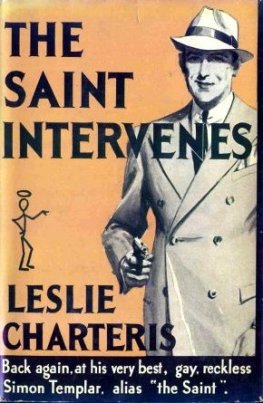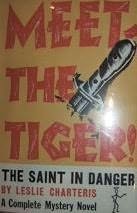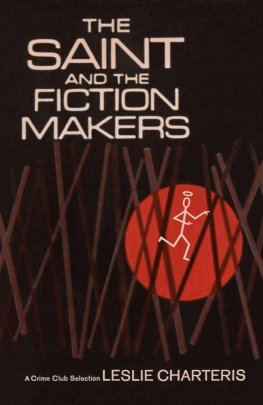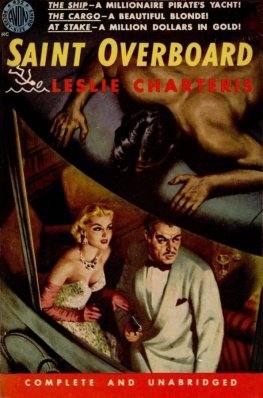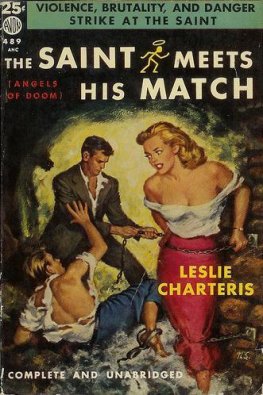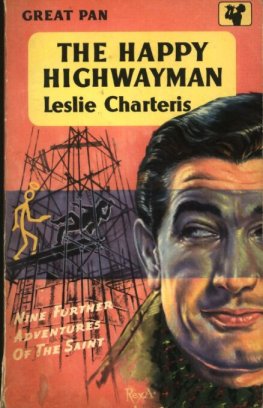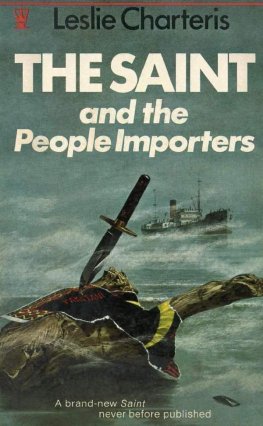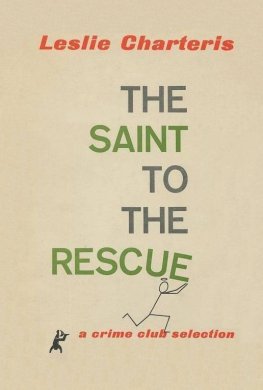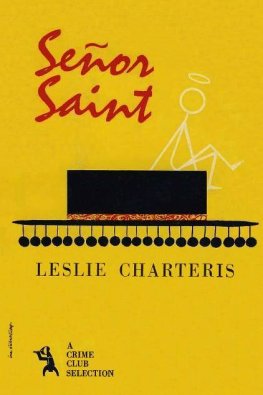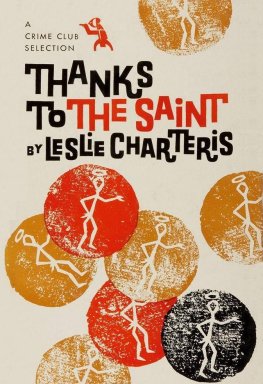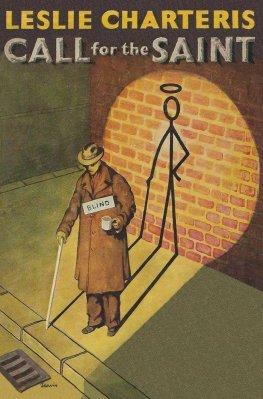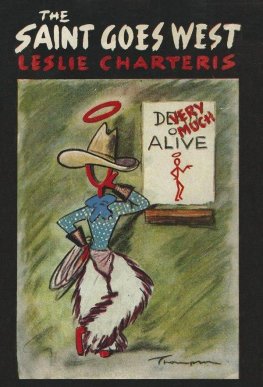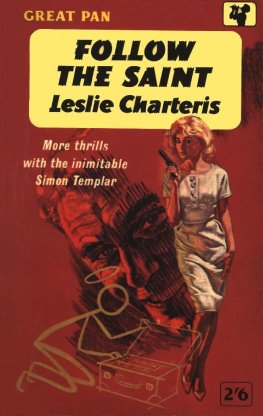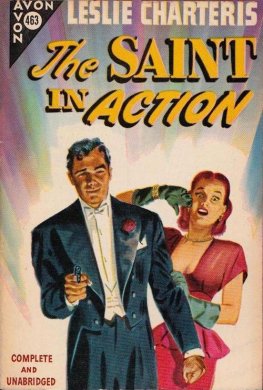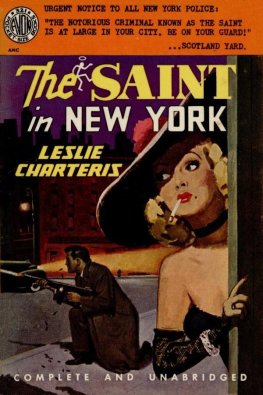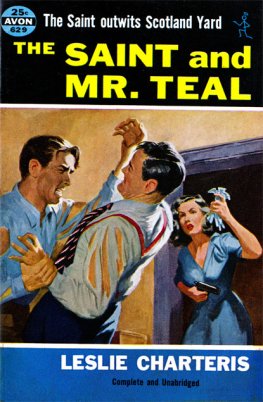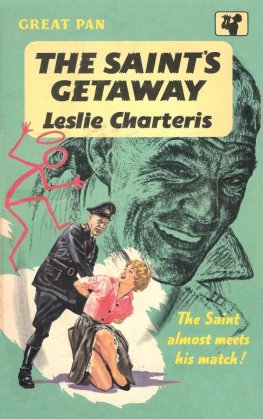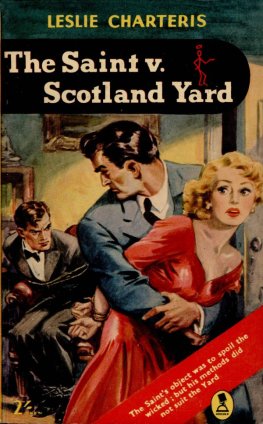Leslie Charteris - The Saint Intervenes
Here you can read online Leslie Charteris - The Saint Intervenes full text of the book (entire story) in english for free. Download pdf and epub, get meaning, cover and reviews about this ebook. year: 1934, publisher: Doubleday, genre: Detective and thriller. Description of the work, (preface) as well as reviews are available. Best literature library LitArk.com created for fans of good reading and offers a wide selection of genres:
Romance novel
Science fiction
Adventure
Detective
Science
History
Home and family
Prose
Art
Politics
Computer
Non-fiction
Religion
Business
Children
Humor
Choose a favorite category and find really read worthwhile books. Enjoy immersion in the world of imagination, feel the emotions of the characters or learn something new for yourself, make an fascinating discovery.
- Book:The Saint Intervenes
- Author:
- Publisher:Doubleday
- Genre:
- Year:1934
- ISBN:9789997507860
- Rating:5 / 5
- Favourites:Add to favourites
- Your mark:
- 100
- 1
- 2
- 3
- 4
- 5
The Saint Intervenes: summary, description and annotation
We offer to read an annotation, description, summary or preface (depends on what the author of the book "The Saint Intervenes" wrote himself). If you haven't found the necessary information about the book — write in the comments, we will try to find it.
The Saint Intervenes — read online for free the complete book (whole text) full work
Below is the text of the book, divided by pages. System saving the place of the last page read, allows you to conveniently read the book "The Saint Intervenes" online for free, without having to search again every time where you left off. Put a bookmark, and you can go to the page where you finished reading at any time.
Font size:
Interval:
Bookmark:
Leslie Charteris
The Saint Intervenes
To H. H. GIbson
Many years ago I resolved that you were one of the first people I must dedicate a book to. But time slips by, and it's sadly easy to lose touch with someone who lives hundreds of miles away. So this comes very late, but I hope not too late; because even though this may be a bad book, if I hadn't come tinder your guidance many years ago it would probably have been very much worse.
The villains in this book are entirely imaginary, and have no relation to any living person.
I
The Ingenuous Colonel
Lieut.-Colonel Sir George Uppingdon, it must be admitted, was not a genuine knight; neither, as a matter of fact, was he a genuine colonel. This is not to say that he thought that sandbags contained the material for mixing trench mortar, or that an observation post was a species of flagpole on which inquisitive brigadiers hung at half-mast; but his military experience was certainly limited to a brief period during the latter days of the war when conscription had gathered him up and set him to the uncongenial task of peeling potatoes at Aldershot.
Apart from that not inglorious interlude of strengthening the stomachs of the marching armies, his career had been far less impressive than the name he passed under seemed to indicate. Pentonville had housed him on one occasion, and he had also taken one short holiday at Maidstone. Nevertheless, although the expensive public school which had taught him his practical arithmetic had long since erased his name from its register of alumni, he had never lost his well-educated and aristocratic bearing, and with the passing of time had added to them a magnificent pair of white moustachios which were almost as valuable to him in his career.
A slight tinge of the old-fashioned conservatism which characterised his style of dress clung equally limpet-like to the processes of his mind.
"These new-fangled stunts are all very well," he said doggedly. "But what happens to them? You work them once, and they receive a great deal of publicity, and then you can never use them again. How many of them will last as long as our tried and proved old friends?"
His companion on that occasion, an equally talented Mr. Sidney Immelbern whose real name, as it happens, was Sidney Immelbern regarded him gloomily.
"That's the trouble with you, George," he said. "It's the one thing which has kept you back from real greatness. You can't get it into your head that we've got to move with the times."
"It has also kept me out of a great deal of trouble," said the Colonel sedately. "If I remember rightly, Sid, when you last moved with the times, it was to Wormwood Scrubs."
Mr. Immelbern frowned. There were seasons when he felt that George Uppingdon's gentlemanly bearing had no real foundations of good taste.
"Well," he retorted, "your methods haven't made us millionaires. Here it's nearly two months since we made a click, and we only got eight hundred from that Australian at Brighton."
Mr. Irnmelbern's terse statement being irrefutable, a long and somewhat melancholy silence settled down upon the partnership.
Even by the elastic standards of the world in which they moved, it was an unusual combination. Mr. Sidney Immelbern had none of the Colonel's distinguished style he was a stocky man with an unrefined and slightly oriental face, who affected check tweeds of more than dashing noisiness and had an appropriate air of smelling faintly of stables. But they had worked excellently together in the past, and only in such rare but human excesses of recrimination as that which has just been recorded did they fail to share a sublime confidence that their team technique would shine undimmed in brilliance through the future, as and when the opportunity arose.
The unfortunate part was that the opportunity did not arise. For close upon eight weeks it had eluded them with a relentlessness which savoured of actual malice. True, there had been an American at the Savoy who had seemed a hopeful proposition, but he had turned out to be one of those curious people who sincerely disapprove of gambling on principle; an equally promising leather merchant from Leicester had been recalled home by an ailing wife a few hours before they would have made their kill. The profession of confidence man requires capital he must maintain a good appearance, invest lavishly in food and wine, and be able to wait for his profits. It was not surprising that Messrs. Uppingdon and Immelbern should watch the dwindling of their resources with alarm, and at times give way to moments of spleen which in more prosperous days would never have smirched their mutual friendship.
But with almost sadistic glee their opportunity continued to elude them. The lounge of the Palace Royal Hotel, where they sat sipping their expensive drinks, was a scene of life and gaiety; but the spirit of the place was not reflected in their faces. Among the lunch-time cocktail crowd of big business men, young well-groomed men, and all their chosen women, there appeared not one lonely soul with the unmistakable air of a forlorn stranger in the city whom they might tactfully accost, woo from his glum solitude with lunch and friendship, and in due course mulct of a contribution to their exchequer proportionate to his means. Fortune, they felt, had deserted them for ever. Nobody loved them.
"It is," admitted Lieut.-Colonel Uppingdon, breaking the silence, "pretty bloody."
"It is," concurred Mr. Immelbern, and suddenly scowled at him. "What's that?" he added.
Somewhat vaguely, the Colonel was inclining his head. But the remarkable point was that he was not looking at Mr. Immelbern.
"What is what?" he inquired, making sure of his ground.
"What's that you're staring at with that silly look on your face?" said Mr. Immelbern testily.
"That young fellow who just came in," explained the Colonel. "He seemed to know me."
Mr. Immelbern glanced over the room. The only man whom he was able to bring within the limits of his partner's rather unsatisfactory description was just then sitting down at a table by himself a few places away a lean and somehow dangerous-looking young man with a keen tanned face and very clear blue eyes. Instinctively Mr. Immelbern groped around for his hat.
"D'you mean he's a fellow you swindled once?" he demanded hastily.
Uppingdon shook his head.
"Oh, no. I'm positive about that. Besides, he smiled at me quite pleasantly. But I can't remember him at all."
Mr. Immelbern relaxed slowly. He looked at the young man again with diminished apprehension. And gradually, decisively, a certain simple deduction registered itself in his practised mind.
The young man had money. There was no deception about that. Everything about him pointed unobtrusively but unequivocally towards that one cardinal fact. His clothes, immaculately kept, had the unostentatious seal of Savile Row on every stitch of them. His silk shirt had the cachet of St. James's. His shoes, brightly polished and unspotted by the stains of traffic, could never have been anything but bespoke. He had just given his order to the waiter, and while he waited for it to arrive he was selecting a cigarette from a thin case which to the lay eye might have been silver, but which Mr. Immelbern knew beyond all doubt was platinum.
There are forms of instinct which soar beyond all physical explanations into the clear realms of clairvoyance. The homing pigeon wings its way across sightless space to the old roost. The Arabian camel finds the water-hole, and the pig detects the subterranean truffle. Even thus was the clairvoyance of Mr. Immelbern.
If there was one thing on earth which he could track down it was money. The affinity of the pigeon for its roost, the camel for the water-hole, the pig for the truffle, were as nothing to the affinity of Mr. Immelbern for dough. He was in tune with it. Its subtle emanations floated through the ether and impinged on psychic aerials in his system which operated on a super-heterodyne circuit. And while he looked at the young man who seemed to know Lieut.-Colonel Uppingdon that circuit was oscillating over all its valves. He summarised his conclusions with an explicit economy of verbiage which La Bruyre could not have pruned by a single syllable.
Font size:
Interval:
Bookmark:
Similar books «The Saint Intervenes»
Look at similar books to The Saint Intervenes. We have selected literature similar in name and meaning in the hope of providing readers with more options to find new, interesting, not yet read works.
Discussion, reviews of the book The Saint Intervenes and just readers' own opinions. Leave your comments, write what you think about the work, its meaning or the main characters. Specify what exactly you liked and what you didn't like, and why you think so.

